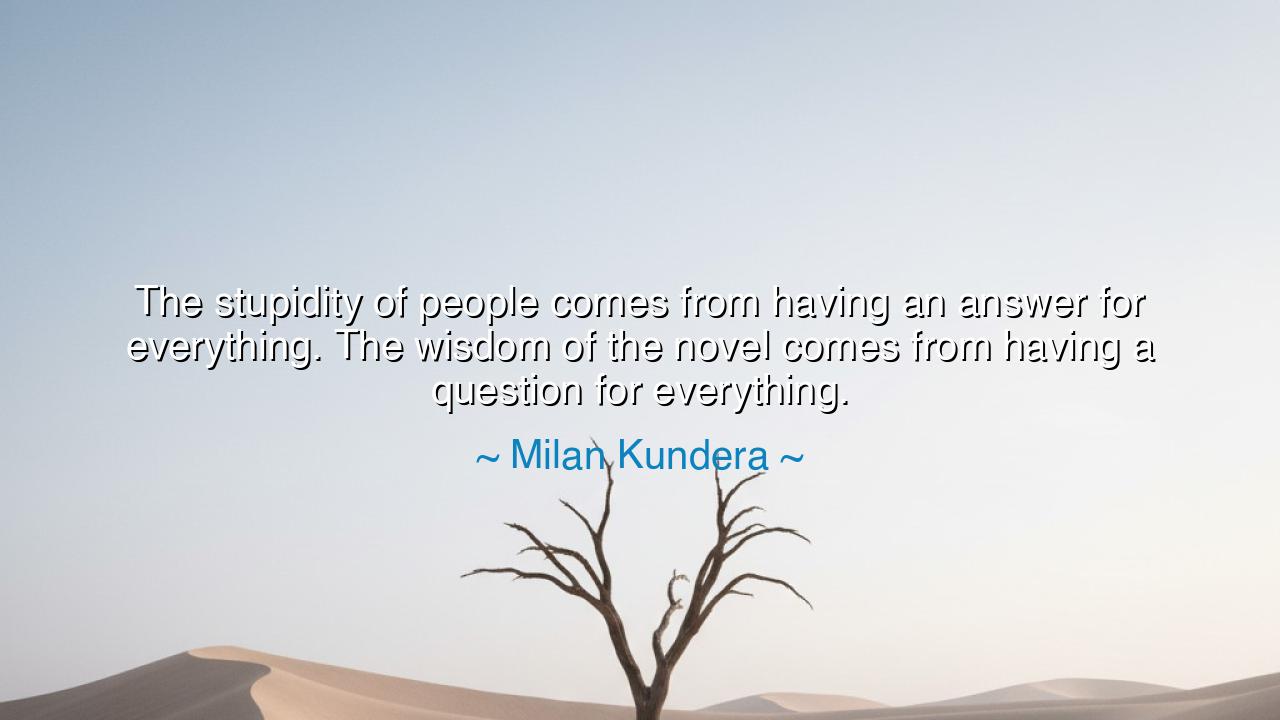
The stupidity of people comes from having an answer for
The stupidity of people comes from having an answer for everything. The wisdom of the novel comes from having a question for everything.






Milan Kundera, master of irony and memory, spoke with penetrating clarity when he declared: “The stupidity of people comes from having an answer for everything. The wisdom of the novel comes from having a question for everything.” In these words he reveals the danger of arrogance and the gift of humility. For to have an answer for all things is to pretend at omniscience, to clothe ignorance in certainty. But to live with questions is to remain open, searching, alive to mystery. The wise know that the world is too vast to be contained in neat replies.
The stupidity of people lies not in their lack of knowledge, but in their unwillingness to admit uncertainty. Those who claim to know all things close the doors of learning, blind themselves to truth, and silence the voices of others. They wield answers like weapons, mistaking rigidity for strength. But the wisdom of the novel, as Kundera teaches, lies in its refusal to simplify life. It asks, it probes, it doubts. It embraces ambiguity as part of the human condition. To hold a question is to honor the depth of existence, to accept that meaning is found in the journey, not in the final word.
History confirms this truth. When the Inquisition sought to impose final answers upon faith and thought, it silenced questions with fire and sword. Yet what did this certainty bring? Darkness, fear, and the shrinking of human spirit. By contrast, the birth of the scientific revolution came not from men with answers already fixed, but from those like Galileo, who dared to ask, “What if?” and to question the accepted order of the heavens. Thus, the progress of humanity is carried forward not by rigid answers, but by courageous questions.
So too in the realm of literature itself. The novels of Fyodor Dostoevsky endure because they do not resolve easily. They wrestle with freedom, guilt, and redemption, leaving the reader not with final answers but with deeper questions. This is their power: to unsettle, to awaken, to remind us that wisdom lies not in closing the book of life, but in keeping its pages turning. In this, the novel becomes a mirror of the soul, reflecting the unending search for meaning.
O children of tomorrow, remember Kundera’s teaching: beware the false comfort of having an answer for everything. Cherish instead the courage of asking, the humility of doubt, the openness of wonder. For in the end, the truest wisdom is not in the answer that silences, but in the question that keeps the spirit awake. Let your life be like a great novel—rich not because it concludes, but because it asks endlessly and deeply.






PEPhuong Em
I feel this statement challenges the cultural obsession with expertise and certainty. Could it be that literature’s power lies in its ability to provoke inquiry rather than provide conclusions? I wonder if people who are comfortable with uncertainty are better equipped to navigate ethical dilemmas, ambiguity, and human relationships. Additionally, is it possible that questioning everything could lead to wisdom, but only if coupled with reflection and discernment rather than endless doubt?
MMLove Mie mee
This quote raises questions about humility and intellectual growth. Does wisdom come more from the process of questioning than from knowing facts? I’m intrigued by the idea that having an answer for everything might make people blind to nuance or complexity. Could the practice of constantly asking questions be a safeguard against dogmatism, or is there a risk of becoming indecisive and perpetually uncertain?
LVLinh Vu
Reading this, I can’t help but think about education systems. Are students being trained to think critically or simply to provide answers that satisfy authority figures? Does cultivating the habit of questioning everything create more intellectual flexibility than memorizing facts? I’d like to explore whether novels, by their nature, encourage questioning of human motives and societal norms in ways that traditional knowledge or factual instruction cannot.
TTLy Tran Tran
I find this thought both humbling and a little unsettling. It suggests that confidence in our knowledge might actually be a form of ignorance. Could the obsession with having the 'right answer' in debates, workplaces, or politics stifle creativity and critical thinking? I’m curious about whether asking questions consistently requires more courage than asserting answers, and if so, why society often rewards the opposite behavior.
HTBui Huyen Trang
This quote makes me reflect on how society often values certainty over curiosity. Is it possible that our insistence on having ready answers limits our understanding of the world? I wonder if embracing questions rather than answers might foster deeper insight and empathy. How much of our perceived wisdom comes from admitting we don’t know, and could literature or art be uniquely suited to cultivate this type of questioning mindset?